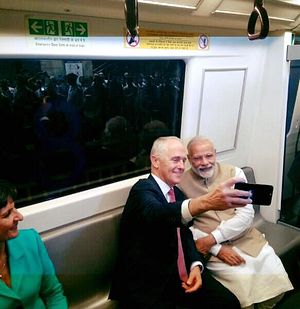Australian Prime Minister Malcolm Turnbull landed in New Delhi on Sunday for a four-day visit to India. During the visit, Turnbull will be conducting a series of meetings with Indian Prime Minister Narendra Modi and other senior government officials, in order to find ways to improve the relationship, particularly focusing on defense and security cooperation, renewable energy technology, and enhancing trade and education.
India is currently the world’s fastest growing major economy, yet is a country that Australia has a vastly underdeveloped trading relationship with. While Australia’s two-way trade with China is around $150 billion per year, its trade with the equally populous India is only around $19 billion per year. A lengthy visit to India by the prime minister is an indication that Australia recognizes the need to greatly improve this trading relationship.
A bilateral free trade agreement between the two countries, known as the Comprehensive Economic Cooperation Agreement (CECA), began negotiations in 2011 and remain on-going. There was some hope that the agreement would be signed during Turnbull’s visit, but this will not be the case. The current sticking points are Australia’s desire to have greater access to Indian markets for its agricultural products, and India’s wish for better access to the Australian labor market for temporary workers.
However, both the Australian and Indian governments are keen to conclude negotiations on the multilateral Regional Comprehensive Economic Partnership, a trade deal involving 10 ASEAN nations, China, India, Japan, South Korea, Australia and New Zealand. Formulating a plan to bring this deal into action will be part of the discussions between the prime ministers.
Alongside India’s political leaders, Turnbull will also be meeting with businessman Gautam Adani, who is waiting on final approval for his controversial planned Carmichael coal mine in northern Queensland. The mine will be an $16.5 billion investment into the region that is projected to produce 2.3 billion tonnes of coal over a 60-year period. However, long term environmental concerns need to be weighed against investment into northern Australia and India’s energy requirements.
Australia sees great potential for engagement with India’s increasing energy requirements, with natural gas, renewable energy technology, and uranium for nuclear energy also having the potential to be major exports. Although Australia has removed its barriers to the sale of uranium to India in a deal that was conducted by Prime Minister Julia Gillard in 2012, none of the material has yet to be shipped to the country.
Of significant note is that Australia’s Education Minister Simon Birmingham, as well as a number of vice-chancellors from Australian universities, are also accompanying Turnbull on the trip. This highlights the importance of education as an industry for Australia. Education is the largest industry in the state of Victoria and a major industry in other states as well. There are currently around 60,000 Indian students studying in Australia.
India has a significantly young population and the country needs to educate vast numbers of people in a short period of time in order to take advantage of its demographic dividend and avert a demographic problem. The opportunity here lies not only in an increase in Indian students in Australia, but also in the ability of Australian educational institutions to expand their presence into India. This has the potential to be a mutually beneficial engagement of great significance, financially, ethically, and strategically.
Turnbull’s trip will also feature major discussions on the security ties between the two countries. With India beginning to move away from the position of strict non-alignment it took during the Cold War, Australia enhancing security ties with a more globally interested India would be a smart move. A prominent Australian think tank has suggested that Turnbull should push for the revival of the Quadrilateral Initiative, a security dialogue involving Australia, India, United States and Japan that was initiated by Shinzo Abe in 2007, but subsequently abandoned largely due to Chinese concerns about encirclement.
Australia has not participated in the now trilateral Malabar naval exercise (involving India and the United States, with Japan joining permanently in 2015) since 2007. To reestablish its participation would be an enhancement to its security relationship with India, but attempting balance this gain with Chinese concerns may prove too difficult.
Australia’s recent wealth has been primarily platformed on its ability to take advantage of China’s economic rise. While India’s economic trajectory will not be as rapid or as easily directed as China’s, its massive population offers the potential to provide similar vast opportunities for Australia should the country wish to pursue them. With India having overtaken China as Australia’s largest source of immigrants there is a growing potential for a more intimate understanding of India within Australian civil society (beyond cricket and yoga). Turnbull’s trip indicates the government has an increased realization of the importance India will play in Australia’s future.

































